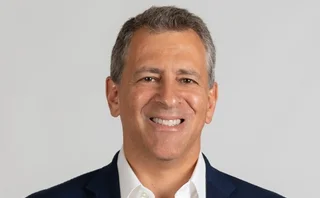
Deal of the Year: ENGIE
Energy Risk Awards 2024: US battery storage deal boosts ENGIE’s renewables business as it works towards net-zero

This year’s Deal of the year award goes to ENGIE for its purchase of an entire merchant battery storage project of more than 350 megawatts (MW) of operating assets with a further 1.7 gigawatts (GW) of assets under development.
The $1 billion deal brings the global energy player closer to its aim of having 10GW of complementary battery storage capacity by 2030. As of December 2023, ENGIE had 1.3GW in operation with a further 3.6GW of battery storage assets under development.
The acquisition of Broad Reach, a Houston-based battery storage specialist, was fraught with complexities. Board Reach had a complicated financing structure that included project finance and holding company debt, as well as private equity investors and owners. For it to continue developing it needed a new financing partner with a strong balance sheet and an understanding of the long-term value of its battery storage assets and expertise. And it needed to find this partner quickly, according to Narsimha Misra, the Houston-based chief executive officer of ENGIE Energy Marketing.
“The team from Broad Reach and ENGIE share a fundamental belief that time is of the essence in the battery storage market,” he says. “Broad Reach was one of the early players in the sector, getting 350MW online over the course of just 17 months. The opportunities in battery storage are so compelling right now and we needed to be in strong hands to execute our business plan today, rather than in a year or more.”
Gaining market share in the battery storage sector is also an attractive proposition for ENGIE. It currently has 5GW of renewables in its US energy portfolio and wants to grow this to 15–20GW by the end of the decade. Battery storage helps manage the volatility inherent in wind and solar assets.

“Balance sheet and market expertise are expected to play a key role in battery storage in the coming years,” says Philippe Vedrenne, executive chairman of GEMS, North America, pointing out that this deal gives ENGIE access to Broad Reach’s significant experience in this market. At the time of the acquisition, the team had already developed 21GW of storage projects in US states including California, Texas and Utah.
But despite both parties’ enthusiasm and willingness to work quickly, completing the deal was challenging. Broad Reach’s private equity seller had a deadline for ending its financing of the company. At the same time, ongoing discussions about reforming the design of the ERCOT market in the wake of 2021’s Storm Uri, added significant uncertainty to the deal terms, as did the project’s merchant power position.
“Battery assets are usually developed on a merchant basis so, unlike wind and solar assets, they are uncontracted. This means investment is exposed to very significant market risk. Only the most sophisticated market players can withstand the exposure that such a large merchant battery portfolio would bring,” Misra says.
So, ENGIE had to work quickly to devise a financing strategy that accounted for both market risk and potential regulatory change. It began due diligence in January 2023. Alongside technical research on the operating assets and those still being planned or under construction, ENGIE worked with external consultants to study the three US markets in which Broad Reach has or is developing assets: ERCOT, CAISO and MISO. It was also able to lean on the in-house expertise of its market-facing division, Global Energy Management and Sales (GEMS).
After ENGIE decided to acquire the entire Broad Reach platform – the team, technology and development assets pipeline – the deal went exclusive in August 2023. The sale of the first set of Broad Reach assets to ENGIE closed in October 2023, while a second transaction involving the assets in Texas under the Federal Energy Regulatory Commission jurisdiction completed in January 2024, once the regulator had given its approval.
The standalone battery storage pipeline now sits comfortably within ENGIE’s infrastructure business, says Vedrenne. “Globally, ENGIE has a 221 terawatt-hour power supply obligation annually,” he notes. “This means constantly going to the marketplace for optionality – buying call options or straddles, for example. There is a lot of work being done to manage both the renewables supply, as well as the negative optionality that ENGIE has. So, the battery storage project is a natural fit because it sits in the middle and minimises risk on both the supply and demand sides.”
And by gaining this piece of the burgeoning battery storage sector, this deal is not only helping ENGIE to scale its US ambitions, it’s also contributing to its aim to reach net-zero emissions across its global business.
Only users who have a paid subscription or are part of a corporate subscription are able to print or copy content.
To access these options, along with all other subscription benefits, please contact info@risk.net or view our subscription options here: http://subscriptions.risk.net/subscribe
You are currently unable to print this content. Please contact info@risk.net to find out more.
You are currently unable to copy this content. Please contact info@risk.net to find out more.
Copyright Infopro Digital Limited. All rights reserved.
As outlined in our terms and conditions, https://www.infopro-digital.com/terms-and-conditions/subscriptions/ (point 2.4), printing is limited to a single copy.
If you would like to purchase additional rights please email info@risk.net
Copyright Infopro Digital Limited. All rights reserved.
You may share this content using our article tools. As outlined in our terms and conditions, https://www.infopro-digital.com/terms-and-conditions/subscriptions/ (clause 2.4), an Authorised User may only make one copy of the materials for their own personal use. You must also comply with the restrictions in clause 2.5.
If you would like to purchase additional rights please email info@risk.net
More on Commodities
Energy Risk Asia Awards 2025: The winners
Winning firms showcase the value of prudent risk management amid challenging market conditions
Data and analytics firm of the year: LSEG Data & Analytics
Energy Risk Awards 2025: Firm’s vast datasets and unique analytics deliver actionable insights into energy transition trends
OTC trading platform of the year: AEGIS Markets
Energy Risk Awards 2025: Hedging platform enhances offering to support traders and dealers in unpredictable times
Electricity house of the year: Natixis CIB
Energy Risk Awards 2025: Bank launches raft of innovative deals across entire electricity supply chain
Voluntary carbon markets house of the year: SCB Environmental Markets
Energy Risk Awards 2025: Environmental specialist amplifies its commitment to the VCM
Sustainable fuels house of the year: Anew Climate
Energy Risk awards 2025: Environmental firm guides clients through regulatory flux
Weather house of the year: Parameter Climate
Energy Risk Awards 2025: Advisory firm takes unique approach to scale weather derivatives markets
Hedging advisory firm of the year: AEGIS Hedging
Energy Risk Awards 2025: Advisory firm’s advanced tech offers clients enhanced clarity in volatile times








